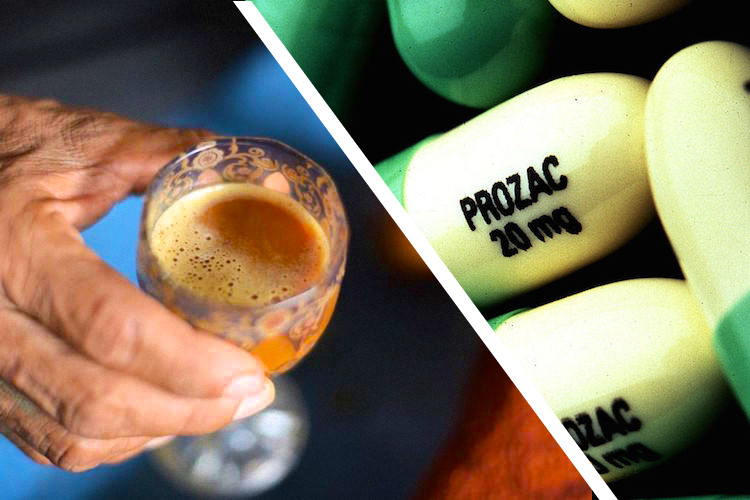Psychedelics and Plant Medicines Dispel the Chemical Imbalance Theory of Depression
Depression is now the number one worldwide cause of disease and disability, according to the World Health Organization. The Diagnostic and Statistical Manual for Mental Disorders (DSM-5), the psychiatric industry’s bible, defines depression as the near daily existence of at least 5 of the following 9 conditions:
1. Depressed mood or irritable most of the day, nearly every day, as indicated by either subjective report (e.g., feels sad or empty) or observation made by others (e.g., appears tearful).
2. Decreased interest or pleasure in most activities, most of each day
3. Significant weight change (5%) or change in appetite
4. Change in sleep: Insomnia or hypersomnia
5. Change in activity: Psychomotor agitation or retardation
6. Fatigue or loss of energy
7. Guilt/worthlessness: Feelings of worthlessness or excessive or inappropriate guilt
8. Concentration: diminished ability to think or concentrate, or more indecisiveness
9. Suicidality: Thoughts of death or suicide, or has suicide plan(Proposed (not yet adopted) anxiety symptoms that may indicate depression: irrational worry, preoccupation with unpleasant worries, trouble relaxing, feeling tense, fear that something awful might happen.) [Source]
Widget not in any sidebars
Diagnosis using this array of possibilities is highly subjective and hardly scientific, and the DSM-5 recommends treatment with pharmaceutical antidepressants, supportive psychotherapy, best guesses, trial and error, observation, hope and luck.
Antidepressants aim to correct chemical imbalances in the brain by adding reactive chemicals to the body, an approach based on the theory that depression is the result of deficiencies in certain chemicals. This theory is tested by tinkering with brain chemistry while looking for signs of decrease in the aforementioned symptoms.
This model is not at all unanimously agreed upon, but it dominates our treatment of depression, although it is just a guess, as admitted in the DSM-5 itself:
The undoubtable success of various antidepressants has focused attention on the biogenic amines: given that all antidepressants have effects on either noradrenergic or serotoninergic functioning, it appears reasonable to assume that there is a complementary disturbance in these amines in patients with major depression. Despite enormous research effort, consistent findings implicating these amines have been difficult to obtain. One exception is the finding that, in patients with major depression currently in an SSRI-induced remission, a depletion of tryptophan, the dietary precursor of serotonin, is generally followed by a rapid relapse of depressive symptoms. [Source]
The chemical imbalance theory is weak, but worse than that it’s one-dimensional, focusing on body chemistry alone without consideration of the emotional complexities of the human psyche and of life itself.
Research into the use of the psychedelic drugs ecstasy, ketamine, LSD, and psilocybin, and the use of shamanic plant medicines ayahuasca and iboga, takes us even further in dispelling the myth of the chemical imbalance theory. Patients, as well as many ordinary people who have experienced these substances, commonly report dramatic breakthroughs in their mental health, with even low doses.
 The commonality in these substances is that they have a distinct psychoactive element, drastically altering ordinary consciousness. Ayahuasca, for example is gaining in renown for its ability to treat depression by inducing a deeply meaningful and personal spiritual experience that offers insight into one’s behavior and past experiences, helping them to develop a more healthy relationship with themselves.
The commonality in these substances is that they have a distinct psychoactive element, drastically altering ordinary consciousness. Ayahuasca, for example is gaining in renown for its ability to treat depression by inducing a deeply meaningful and personal spiritual experience that offers insight into one’s behavior and past experiences, helping them to develop a more healthy relationship with themselves.
A 2016 review of observational studies of regular users found reductions in dependence and substance use; a preliminary 2015 study for depression treatment found 82 percent reductions in depression scores; and another 2016 review found that short-term use was associated with “improved planning and inhibitory control,” with potential antidepressive and anti-addiction applications. [Source]
The African plant medicine iboga works in a very similar manner, and can reprogram self-defeating and self-destructive patterns of thought in a single shamanic ceremony by sending the patient on an intense personal journey of introspection and connection to the higher dimensions of themselves, even allowing them to communicate directly with their own soul.
These substances work by affecting other components of the multi-dimensional human being, and as these concepts fall far outside of the purview of the scientific method, they are easily dismissed by the type of empirically minded scientists involved in projects like creating the DSM-5. Never-the-less, the psychedelic experiences mentioned here can be highly effective, offering compelling evidence that depression is at least for some, a spiritual condition, and as such the chemical imbalance theory is incomplete.
The chemical imbalance theory is critical to the domination of depression treatment by the pharmaceutical industry, but as research proceeds, and as people continue to relay their personal experiences in healing themselves with the aid of these consciousness expanding substances, we have more and more evidence to suggest that the pharmaceutical treatments may not be the best or only option for treating depression.
Read more articles by Dylan Charles.
Dylan Charles is a student and teacher of Shaolin Kung Fu, Tai Chi and Qi Gong, a practitioner of Yoga and Taoist arts, and an activist and idealist passionately engaged in the struggle for a more sustainable and just world for future generations. He is the editor of WakingTimes.com, the proprietor of OffgridOutpost.com, a grateful father and a man who seeks to enlighten others with the power of inspiring information and action. He may be contacted at [email protected].
This article (Psychedelics and Plant Medicines Dispel the Chemical Imbalance Theory of Depression) was originally created and published by Waking Times and is published here under a Creative Commons license with attribution to Dylan Charles and WakingTimes.com. It may be re-posted freely with proper attribution, author bio, and this copyright statement.


